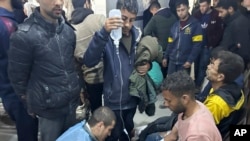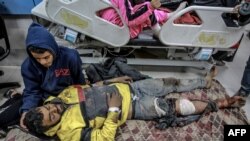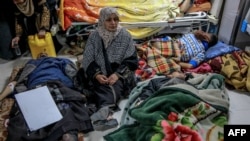By mid-afternoon the Hamas-run health ministry said more than 100 people were reported dead in the grisly incident which underscored worsening shortages in the war-ravaged Palestinian territory.
"There were crowds of people, but the occupation (forces) kept firing towards us," one young man told AFP while lying on the dirty, crowded floor at Kamal Adwan Hospital waiting for treatment.
He was among those wounded in the chaos. But there were conflicting reports on what exactly unfolded in the hours before dawn.
Ali Awad Ashqir, who had gone to get some flour for his starving family, had been waiting for two hours when violence erupted.
"At approximately 4:00 am the trucks began to arrive. The moment they arrived, the occupation army fired artillery shells and guns," he told AFP.
"I was hit by a bullet in the left foot and taken to Al-Shifa Hospital. I was later discharged because my injuries were moderate."
Hossam Abu Safiya, director at Kamal Adwan Hospital, said all the casualties were hit by "bullets and shrapnel from occupation forces."
Ashraf al-Qudra, spokesman for Gaza's health ministry, denounced what he called a "massacre" at Gaza City's Nabulsi roundabout, saying 112 people were killed and 760 wounded.
He blamed Israeli troops, and Israeli sources confirmed to AFP that the Israeli forces at the scene did open fire, having perceived the crowds near the trucks as a "threat."
But a spokesman for Israeli Prime Minister Benjamin Netanyahu's office said many of the dead were crushed by the trucks themselves.
"Aid trucks were overwhelmed by people trying to loot and drivers ploughed into the crowd of people, ultimately killing tens of people," said the spokesman, Avi Hyman.
Gazans storm trucks
Rear Admiral Daniel Hagari, an Israeli army spokesman, said on Thursday night that "thousands of Gazans" swarmed the trucks bearing aid from Egypt, "violently pushing and even trampling other Gazans to death."
Israeli tanks escorting fired warning shots and tried to retreat, Hagari said, denying the army had turned its tanks on civilians.
"We did not fire at the humanitarian convoy — neither from the air nor from the ground," he said.
Outside Kamal Adwan Hospital, four women in headscarves wailed while clutching at the lifeless body of a bearded man wrapped in white cloth.
At Al-Shifa hospital in Gaza City, doctors were "unable to deal" with the flood of casualties "as a result of weak medical and human capacities," Qudra said.
Israel has vowed to eliminate Hamas after it carried out an unprecedented attack on October 7 on southern Israel.
The Hamas attack resulted in the deaths of around 1,160 people, mostly civilians, according to an AFP tally of official Israeli figures.
Umm Hamdan Abu Sultan, a displaced woman waiting for aid near the scene, said: "They are the terrorists, not us."
"Our children are dying of hunger, we go to get a bag of flour to feed our children and they fire at them."
Israel's withering military response to the October 7 attack has now killed at least 30,035 people, mostly women and children, according to the health ministry, which does not specify how many fighters are included in the toll.
The offensive has caused widespread devastation in Gaza and severe shortages of food, water and medicine.
'Under siege'
For months, aid workers have warned of an increasingly desperate situation for Gazan civilians, and on Monday an official from the UN humanitarian office OCHA said widespread starvation was "almost inevitable."
UN estimates show that 2.2 million people — the vast majority of Gaza's population -- are threatened with famine, particularly in the north where destruction, fighting and looting make the delivery of food almost impossible.
According to the UN agency for Palestinian refugees, UNRWA, just over 2,300 aid trucks entered the Gaza Strip in February, a drop of about 50 percent compared with January.
That is an average of well below 100 trucks per day, down from around 500 that were entering daily before the war.
It was precisely that scarcity that drove crowds to rush the trucks at Nabulsi roundabout on Thursday, a witness told AFP.
Aerial footage distributed by the Israeli military showed large groups swarming a line of moving trucks on foot.
"Trucks full of aid came too close to some army tanks that were in the area and the crowd, thousands of people, just stormed the trucks," the witness said, declining to be named for safety reasons.
"The soldiers fired at the crowd as people came too close to the tanks."
Thursday's incident spurred a heated exchange at the Human Rights Council in Geneva, where Palestinian ambassador Ibrahim Mohammad Khraishi confronted his Israeli counterpart about the reported casualties.
"Are these human shields? Are these Hamas combatants?" Khraishi asked.
At Kamal Adwan hospital, a Palestinian woman said: "We are under siege. Take pity on us. Ramadan is coming soon. People should look at us. Pity us."




Forum